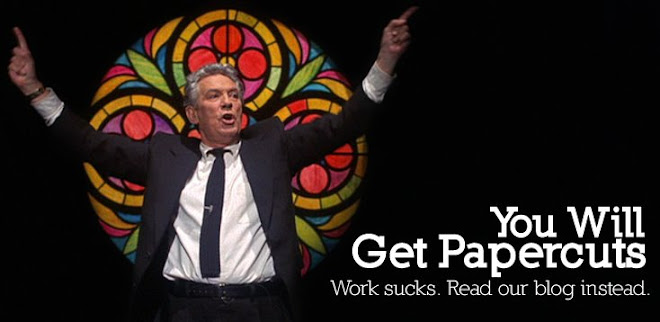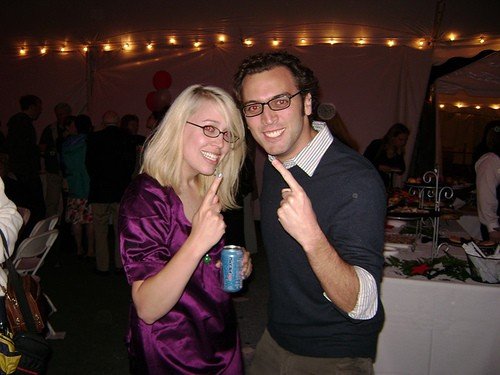Gawker has a longstanding hate-hate (kinda love?) relationship with Keith Gessen, a founding editor of n+1 and young journalist/novelist/blogger/cultural paver/borderline elitist. Gawker’s relentless reports on Gessen’s blog, dating habits, and various random tidbits were really my only exposure to this guy, so when his novel All The Sad Young Literary Men came out in 2008, I foolishly shunned it because I’m a Gawker addict.
Then last year, my co-blogger Dan invited me to an event at Housing Works Bookstore Café where all lit journals could be snatched up at $2 a pop. Score! I happened to pick up a copy of an n+1 Research Branch Pamphlet called WHAT WE SHOULD HAVE KNOWN: TWO DISCUSSIONS. Gessen acted as moderator of two panels that met and shot the shit about the books they wished they had read in college, or books they wished they hadn’t read ever, or books that changed their lives. My respect for Gessen grew quietly (he did lament his late exposure to the Velvet Underground) and my awareness of him morphed from “one to be avoided” to “one to be kind of on top of,” in an intellectual capacity, of course. But it should be noted that he was voted one of NY’s 50 Hottest Bachelors by Page Six in February, 2009. You be the judge:

(Image from here.)
So by the time I moved into my friend Rebecca’s gloriously book-shelved apartment, I found myself unable to stop from picking up Gessen’s first novel and trying on the first page for size. I read:
“They saved on orange juice, sliced bread, they saved on coffee. On movies, magazines, museum admission (Friday nights). Train fare, subway fare, their apartment out in Queens. It was a principle, of sorts, and they stuck to it. Mark and Sasha lived that year on the 7 train and when they got out, out in Queens, Mark would follow Sasha like a little boy as she checked the prices at the two Korean grocers, cross-checked them, so they could save on fruits and vegetables and little Korean treats. They saved on clothes… To be poor in New York was humiliating, a little, but to be young—to be young was divine.”
Fresh out of a "Save-and-not-spend, Queens-7-Train" situation, this opening passage resonated with me like nothing else that I’d read in awhile. So I read 50 more pages that night and finished the book about a day later. A quick read, even by subway rider standards.
Gessen structures his narrative around three guys: Mark, Sam, and Keith (haha autobiographical!) While all three characters differ, all three are pretty much the same. Mark gets married right out of college to his Russian girlfriend, and he passionately studies and reads and obsesses over Russian history/politics for the next decade. Sam works at a shit Excel temp job and passionately studies and reads and obsesses over the current Israeli-Palestinian unrest. Keith falls in love with Al Gore’s daughter while studying at Harvard, but loses her like Gore loses the 2000 election, and then he spends the rest of the novel passionately studying, reading, and obsessing over US politics. Of course this slapdash generalization drastically oversimplifies, but the aim of Gessen’s story lies in describing the awful (yet pretty elitist; come on, you have to be loaded or lucky to go to Harvard) plight of the young, serious thinker who wants to do something intellectually satisfying that, in this Capitalist country, can at least make life livable, salary-wise.
Equally elitist and media-addled Jonathan Franzen, awesome author of The Corrections, and notably awkward public speaker (from experience, people) loved Gessen’s book, praising, “Cruelty and affection and erudition and innocence are so perfectly balanced in these stories, they almost make me wish I were young again.”
But these “Sad Young Literary Men” don’t just want to “make it” on the merits of their intellects. They also want impeccably complicated, intellectually engaged, vaguely mysterious yet comfortingly familiar, well-dressed and gorgeous young women. And the novel weaves a web of pretty realistic inner negotiations that these guys go through when it comes to fucking or not fucking based on these aforementioned qualifications. Of course with a laundry list like that, most of the women fail and fail hard.
The only girl to show up in each of the three sections is Arielle, who Gessen describes as:
“Arielle wanted more and wanted less: she wanted a life of excitement, witticisms, put-downs, quasi-psychoanalytic late-night discussions, then make-up sex—and no children.”
Sounds pretty ideal, right? Did I mention that when we first meet Arielle, she’s, like, 22 and staying in a sanatorium?
Emily Gould (ex-Gawker editor and rumoured Gessen-ex) wrote a smart piece on the book, comparing it, and I think justifiably so, to a Judd Apatow production. Her qualms mirror mine: the book makes much ado about men’s problems and doesn’t really extend the "Problem Umbrella" to the women that populate the book as background characters. Arielle goes to an insane asylum due to her break-up with Sam. Israeli Talia gives Sam some major agita about whether or not he's Jewish enough. Al Gore’s daughter Lauren can’t allow herself to fall for noble, good-hearted Keith but fucks the Harvard asshole who drinks every night in his pink J. Crew shorts and loafers. Celeste calls Mark’s phone and leaves many hysterical messages. Leslie passive-aggressively forces Mark to come back to her place while he's bombed out of his mind. Sounds a little like the roles played by Leslie Mann and Katherine Heigl in Knocked Up, right?
The only three women in the novel who come close to getting fair treatment are Sasha (Mark’s ex-wife) because she is fundamentally morally good, Katie (the sex writer involved with Sam) because she is smart and good in bed (at least I think that is part of the reason) and Gwyn (Keith’s girlfriend) because by the book’s end she is something like 10 years his junior and constantly avows her love and fascination for men who still live and die by the rules of serious intellectual thinking.
Do I think the book is sexist? Yes, and that should be acknowledged and discussed.
Do I think the book has to be read under that lens? No, absolutely not.
Every problem each man faces in the book, I have faced or am facing. The relate-ability quotient is very high, I think, for anyone who finds themselves lucky/unlucky enough to be 22-23-24-25. Both guys and girls who graduated from liberal arts schools (Ivy or not) find themselves floundering after graduation. We want to use our degrees and passion for whatever it is that drives us to write, read, or think to further ourselves, even if just a little bit, in the world. But in this society it’s not easy to get to a place where you can support yourself doing anything that comes close to what you love, or even, what you can stand behind.
And then add in all the other problems. We all have to face our heritage, whether it be Jewish or Russian or Agnostic or Martian or Beyond. We all have to extricate ourselves from our families yet simultaneously remain tied to them. We all have to go through the life and death cycles of good and bad relationships, and we all have to deal with the undeniable, biological need for fucking that throws a molotov cocktail into the whole mess.
I mean, a passage like the one below seems pretty universal to me:
“I was twenty years old. When you are twenty years old, and twenty-one, and twenty-two, and twenty-three, and twenty-four, what you want from people is that they tell you about you. When you are twenty, and twenty-one, twenty-two, twenty-three, you watch the world for the way it watches you. Do people laugh when you make a joke, do they kiss you when you lean into them at a party? Yes? Aha—so that’s who you are. But these people are not to be trusted, your contemporaries, your screwed-up friends and girlfriends—that’s not because of you that they kissed you, but because of them, something about them, those narcissists, whereas you were asking about you, what did they think of you? Now you have no idea.”
I think the book is about any person who wants to get to the self-actualized point where he or she can work at a job they love, read The New York Times, The Economist, The Wall Street Journal, The New Yorker and all the best-selling and important novels of the time (and the past) on a regular basis, donate money to causes, master the art of culinary awesomeness, cut slacking out entirely, learn 4 new languages, travel to solidify those languages, become engaged in a community (online or in real life), follow sports and care about them, go to concerts, support artists, and have time for a mind-blowing and meaningful relationship. Etc. Etc. Etc.
And, even though we know it is fundamentally impossible, we want to do all of this very important, earnest work before the age of 30.
No wonder we’re “Sad.” The pressure to do everything, the pressure that we put on ourselves, is overwhelming. But the beauty in Gessen’s book hovers in his humor and the moments where emotions overpower the intellectual drive and his three main characters act on instinct instead of book smarts.
So if you can get past the horse-in-blinders focus on MEN AND THEIR EXTREMELY IMPORTANT PROBLEMS in this novel, and the very self-assured comma-happy grammatical structures (which seem a little too cutesy for me; like, as if Wes Anderson’s visual aesthetic had been contained in the form of punctuation) then I highly recommend All the Sad Young Literary Men as a book that anyone our age should read.
And, for what it’s worth, here is Keith Gessen’s List: Books That Changed My Life.
Honoré de Balzac, Lost Illusions (1837-39)
Leo Tolstoy, War and Peace (1865-69)
Don DeLillo, White Noise (1985)
Joseph Brodsky, Less Than One: Selected Essays (1986)
Michael Houellebecq, Elementary Particles (1998)
Thomas Frank and Matt Weiland, eds. Commodify Your Dissent (1997)
Irving Howe, A Margin of Hope (1982)
Philip Roth, Zuckerman Bound (1979-85); Sabbath’s Theater (1995)
Adam Ulam, The Bolsheviks (1965)
Saul Bellow, Herzog (1965); Humboldt’s Gift (1975)



"One of the mixed blessings of being twenty and twenty-one and even twenty-three is the conviction that nothing like this, all evidence to the contrary notwithstanding, has ever happened to anyone before."
ReplyDelete-Joan Didion